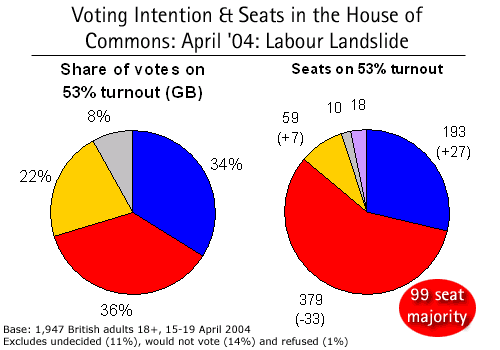One Year To Go!
One year to go until the next General Election. May 5, 2005, is my odds-on bet for the date of the next election, which given the rules, it is likely to be called on Thursday, 7 April. There are two other anniversaries that have been celebrated (?) in the past few days: Tony Blair's 7th year in office, and the invasion of Iraq a year ago.
Each of these anniversaries will have their impact on the next election, as will the public's anxiety that Labour's policies have failed, and more importantly will continue to fail to deliver public services, and the switchover from a desperate Tory Party from its hopeless leader Iain Duncan Smith to Michael Howard.
Let's take each in turn
First, why have I been forecasting the next election timing with such certainty for so long? The Parliamentary mandate runs out after five years, i.e., June 2006. No Prime Minister wants to chance 'events, dear boy, events' in the final year of his or her mandate. Local government elections are held on the first Thursday in May. Governments usually do badly in local elections. Prime Ministers do not like to hold General Elections in the wake of bad election results. Or in the dark. Or in holiday times. Or when Parliament isn't setting on the day he or she wishes to go to the Palace to ask for dissolution.
Therefore, we tend to have elections in the spring, and how better to get turnout up, to run the least risk of disruption, and to maximise the chance of re-election? On local Election Day in May of the fourth year of your term. That's why 5 May 2005 has been my forecast of the date of the next election here in PM and elsewhere since 2001.
Prime Ministers with poor poll ratings and their backs to the wall either as Jim Callaghan did in 1978 and John Major in 1997 tend to ignore this. Because, they suspect (Callaghan) or know (Major) that they are going to lose, and thus they keep onto power and perks to the last minute, hoping that a miracle will save them. It didn't, either of them. They also tend to longer campaigns, four or even six weeks, while likely winners opt for shorter campaigns, so I have suggested the 7th of April next year the Prime Minister will ask HM to prorogue Parliament for a four-week election campaign.
My own view is that Iraq will not have too much of a direct effect on the outcome of the election, but that the decline of trust in the PM will, which was caused partly but by no means entirely by the failure to find any weapons of mass destruction in Iraq, for cosying up too close to the American President whose unpopularity in this country is both deep and wide, and for his too evident loyalty to unpopular colleagues who have let him (and themselves) down by their behaviour, and for setting himself up for a fall in appearing to the electorate to promise public service delivery when he hasn't been able to carry out his promises. Even worse, the electorate's faith in him and his government to improve public services in the future is no longer as strong as it was before the last election.
Nonetheless, as the graphic shows, even a near dead heat on Election Day will still come close to delivering Labour its third landslide victory, due to the vagaries of the boundary decisions and somewhat to the vulnerability of the Conservatives to increasing public support of the Liberal Democrats. At the start of the election in 2001, the Lib Dems were around 15% and had been for some time. They got nearly 19% on election day, as alienated Tories who couldn't vote for Labour but wouldn't vote for William Hague for Prime Minister, and alienated Old Labour supporters who couldn't bring themselves to vote for Blair (again) or ever vote for the Tories yet feeling an obligation to cast their ballot chose the easy option of the protest vote for the Lib Dems, knowing they weren't going to win anyway.
Now the Liberal Democrats have enjoyed a good run of polls for several years, flat lining at c. 21%. With a comparable four-point rise, they'd add on at least ten more seats in the House of Commons (and likely more with canny targeting), on a ratio of four to one taken from the Tories, which of course wouldn't affect the Labour majority over all other parties.
But the size of the hole that the Tories are in something we've been modelling since the last election. They can get Parliament hung with as little (little?) as a six-point lead over Labour with the Lib Dems at 25% share. But to get to an overall majority, given the size of the swing required to rack up victories in only semi-marginal seats will require a lead of over ten, perhaps even 12 or 13.
And it is becoming increasingly clear that although Michael Howard is popular beyond his wildest dreams in Parliament, he has yet, despite Blair's manifest plethora of problems, failed to ignite the electorate, and there is only now one year to go.

Key Political Findings
| Month of Polling | Voting Intention ("Certain") | Satisfaction Rating | Economic Optimism Index | Issues Concerning Britain (Top 3) |
|---|---|---|---|---|
| February 2004 | Cons 35% Labour 36% Lib Dems 21% | Gov't 27% Blair 31% Howard 29% Kennedy 39% | -18 | NHS 37% Immigration 35% Education 33% |
| March 2004 | Cons 35% Labour 35% Lib Dems 23% | Gov't 25% Blair 32% Howard 31% Kennedy 40% | -22 | Defence 41% NHS 35% Immigration 31% |
| April 2005 | Cons 34% Labour 36% Lib Dems 22% | Gov't 26% Blair 31% Howard 28% Kennedy 38% | -18 | Defence 47% Immigration 36% NHS 34% |



